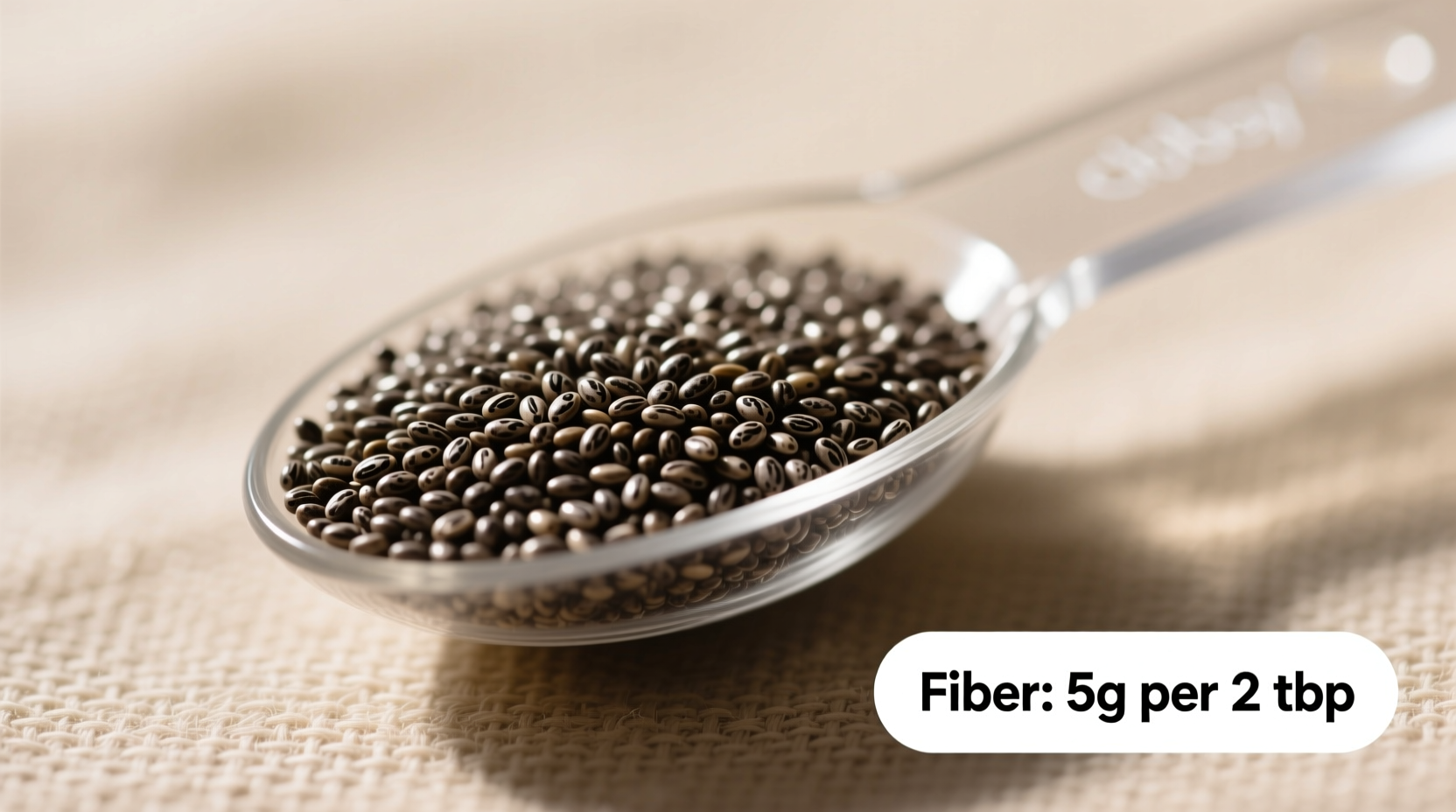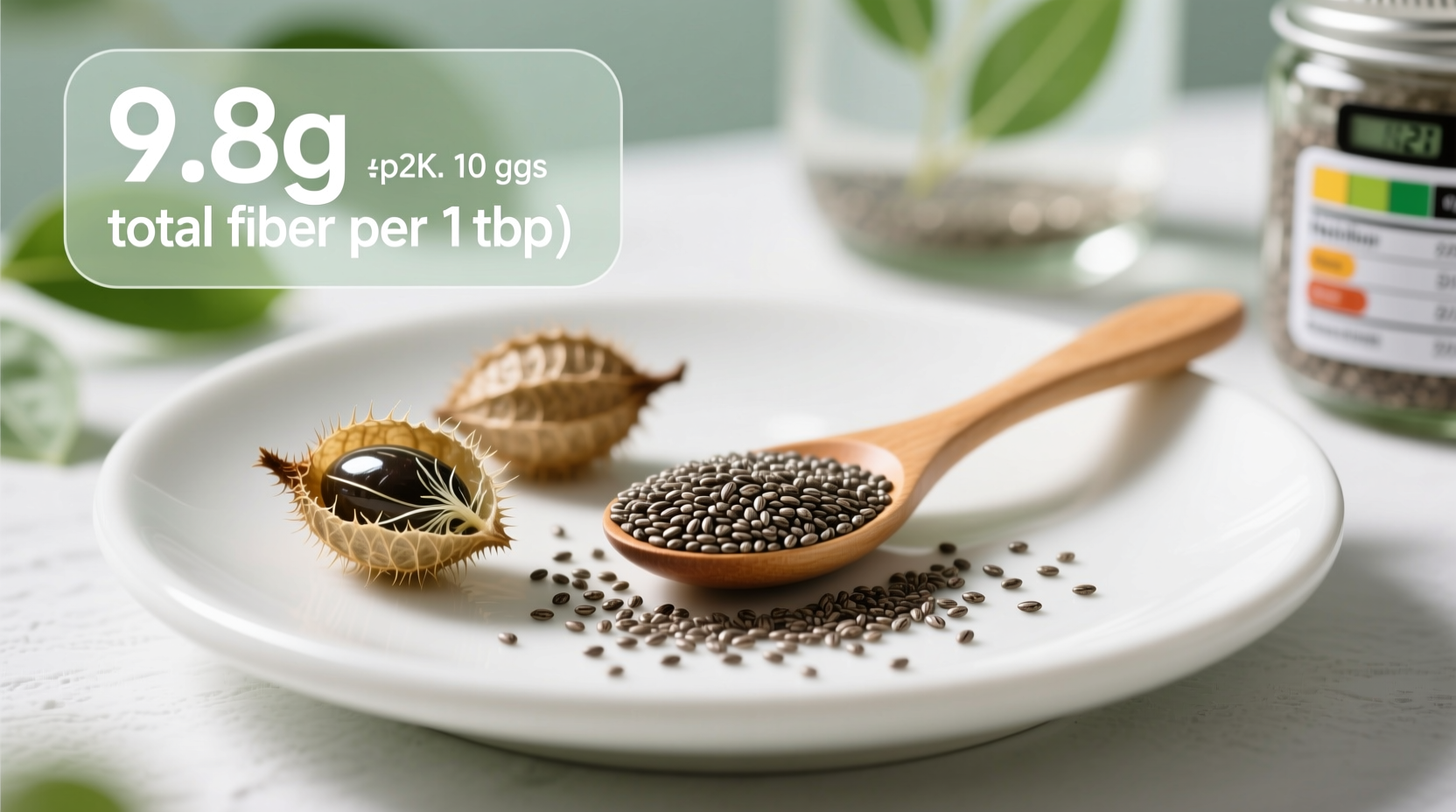When you add just one spoonful of chia seeds to your morning smoothie or yogurt, you're making a powerful move for your digestive health and overall wellness. Understanding exactly how much fiber you're getting—and why it matters—can transform how you approach daily nutrition.
Why Fiber Content Matters in Your Daily Diet
Fiber plays a critical role in maintaining digestive health, regulating blood sugar levels, and supporting heart health. The American Heart Association recommends adults consume 25-30 grams of fiber daily, yet most Americans only get about half that amount. Incorporating high-fiber foods like chia seeds represents one of the simplest strategies to bridge this nutritional gap.
Breaking Down the Fiber in Chia Seeds
Chia seeds stand out among plant-based foods for their exceptional fiber concentration. Let's examine the specific composition:
| Nutrient | Per 1 Tbsp (12g) | % Daily Value |
|---|---|---|
| Total Dietary Fiber | 5g | 20% |
| Soluble Fiber | 3g | - |
| Insoluble Fiber | 2g | - |
This nutritional profile comes directly from USDA FoodData Central, the authoritative source for food composition data in the United States. The 5g fiber measurement represents the average from multiple laboratory analyses of commercially available chia seeds.
How Chia Seeds Compare to Other Fiber Sources
When evaluating fiber sources, context matters. Consider how chia seeds stack up against other common options:
| Fiber Source | Serving Size | Fiber Content | Calories |
|---|---|---|---|
| Chia Seeds | 1 Tbsp (12g) | 5g | 58 |
| Flax Seeds | 1 Tbsp (10g) | 3g | 37 |
| Oat Bran | 1/4 cup (24g) | 4.2g | 70 |
| Blueberries | 1 cup (148g) | 3.6g | 84 |
This comparison shows chia seeds deliver superior fiber density per calorie compared to many alternatives. Research published in the Journal of Food Science and Technology confirms chia's exceptional nutritional efficiency, making it particularly valuable for those managing calorie intake while needing substantial fiber.

Practical Ways to Use Chia Seeds for Maximum Benefit
Understanding the fiber content is only valuable if you can apply it practically. Here's how to incorporate that single tablespoon effectively:
- Morning boost: Stir 1 tbsp into yogurt or oatmeal (absorbs liquid within 15 minutes)
- Hydration helper: Mix with water to create chia fresca (1 tbsp seeds + 8oz water + lemon)
- Baking upgrade: Replace 1 egg with 1 tbsp chia seeds + 3 tbsp water (let sit 5 minutes)
- Smoothie secret: Add to fruit smoothies without altering flavor significantly
Registered dietitians at the Academy of Nutrition and Dietetics note that chia's soluble fiber forms a gel when hydrated, which slows digestion and promotes longer-lasting fullness—a benefit not found in all fiber sources.
Important Considerations for Different Health Situations
While chia seeds offer impressive fiber benefits, they're not universally appropriate. Consider these context boundaries:
- Those with swallowing difficulties should avoid dry chia seeds due to rapid expansion when liquid is added
- Individuals with irritable bowel syndrome may need to introduce chia gradually to assess tolerance
- People taking blood thinners should consult their physician before adding significant chia to their diet
- Those with seed allergies must obviously avoid chia seeds entirely
The European Food Safety Authority has established that chia consumption up to 15g daily (about 1.25 tbsp) presents no safety concerns for the general population, but individual tolerance varies.
Long-Term Benefits of Consistent Chia Seed Consumption
Research tracking chia seed consumption over 12-24 weeks shows promising results. A study in Nutrients journal found participants consuming 25g chia daily (about 2 tbsp) experienced:
- Improved bowel regularity in 87% of participants
- Reduced post-meal blood sugar spikes by 30% on average
- Increased feelings of fullness leading to modest weight management benefits
- Enhanced nutrient absorption from other foods consumed with chia
These effects stem primarily from chia's unique fiber composition—both soluble and insoluble fibers working synergistically with other nutrients in the seeds.











 浙公网安备
33010002000092号
浙公网安备
33010002000092号 浙B2-20120091-4
浙B2-20120091-4